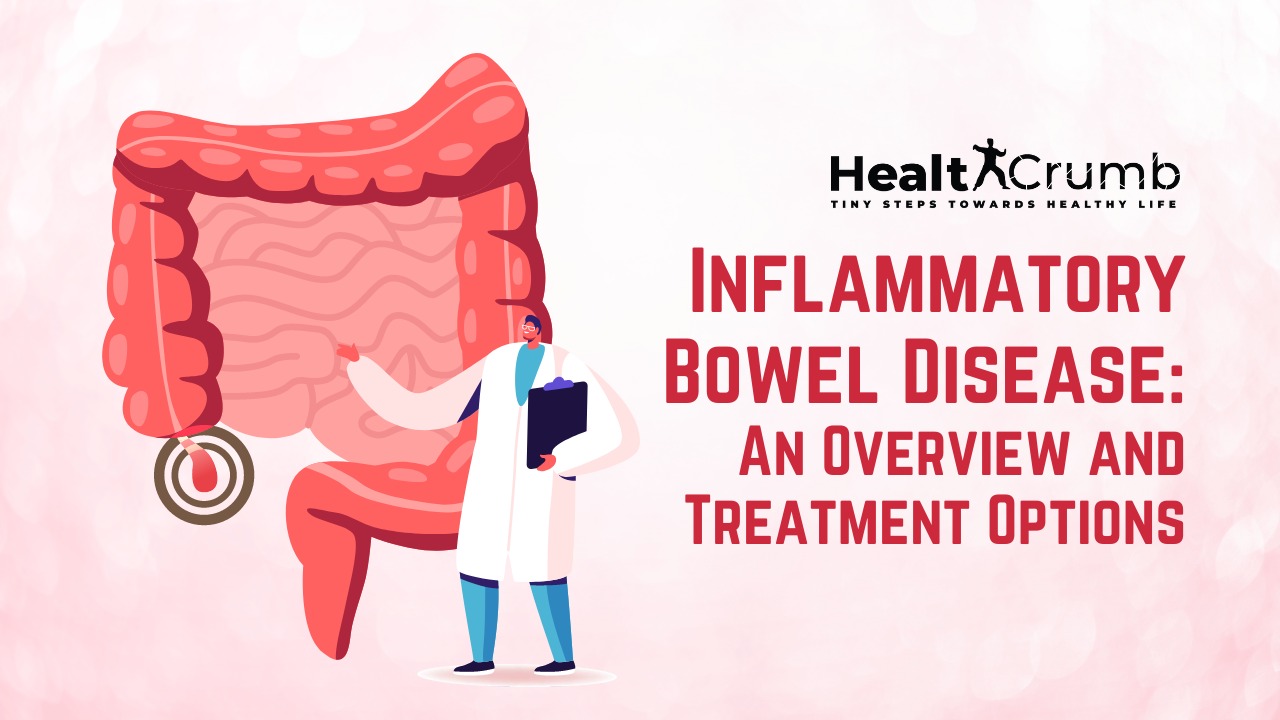Inflammatory bowel disease (IBD) is a broad term that describes conditions characterized by chronic inflammation of the gastrointestinal (GI) tract. The two most common types of IBD are ulcerative colitis and Crohn’s disease.
Although IBD can develop at any age, it typically begins in young adulthood. Symptoms of IBD include abdominal pain, diarrhea, rectal bleeding, weight loss, and fever. Treatment for IBD typically involves a combination of medication and lifestyle changes.
If you have inflammatory bowel disease (IBD), you are not alone. IBD is a chronic condition that affects millions of people worldwide. While there is no cure for IBD, there are treatments available that can help to manage the symptoms and improve quality of life.
In this blog section, we will explore some common symptoms of IBD, as well as treatment options that are available. We will also provide tips on how to live with IBD and manage day-to-day life with the condition.
What is Inflammatory Bowel Disease (IBD)?
Inflammatory bowel disease (IBD) is a chronic inflammation of the gastrointestinal (GI) tract. The GI tract is made up of the stomach, small intestine, large intestine (colon), and rectum. IBD can affect any part of the GI tract, but most commonly affects the small intestine and colon.
There are two major types of IBD: Crohn’s disease and ulcerative colitis. Crohn’s disease is characterized by inflammation of the GI tract lining, which can lead to ulcers, fissures, fistulas, and obstruction. Ulcerative colitis is characterized by inflammation and ulceration of the innermost layer of the colon.
IBD is a relapsing-remitting disease, which means that symptoms will come and go over time. Flares can be triggered by stress, diet, or other factors. Some people with IBD will have long periods of remission with no symptoms at all, while others may have frequent flares.
There is no cure for inflammatory bowel disease, but there are treatments that can help to control symptoms and prevent flares. Treatment options include medications, surgery, and lifestyle changes.
What Are The Major Types?
There are two major types of IBD: Crohn’s disease and ulcerative colitis. Both diseases involve inflammation of the digestive tract, but they differ in the location and severity of the inflammation.
Crohn’s disease: It is characterized by inflammation of the GI tract lining, which can lead to ulcers, fissures, fistulas, and obstruction.
Crohn’s disease can affect any part of the digestive tract, from the mouth to the anus, but most commonly affects the small intestine. The inflammation is usually patchy, meaning it affects some areas more than others. Crohn’s disease can also cause fistulas, which are abnormal tunnels that connect different parts of the intestine or connect the intestine to other organs.
Symptoms of Crohn’s disease include abdominal pain, diarrhea, weight loss, and fatigue.
Ulcerative colitis: It is characterized by inflammation and ulceration of the innermost layer of the colon. Ulcerative colitis, only affects the large intestine (colon). The inflammation is continuous, meaning it affects the entire colon. Ulcerative colitis does not usually cause fistulas.
Symptoms of ulcerative colitis include abdominal pain, bloody diarrhea, weight loss, and fatigue.
Both Crohn’s disease and ulcerative colitis are chronic conditions, meaning they can last for years or even a lifetime. There is no cure for IBD, but there are treatments that can help manage the symptoms and improve quality of life.
Treatment for IBD depends on the severity of symptoms and may include medication, surgery, or both. Mild cases of IBD may be treated with anti-inflammatory drugs or immunosuppressants. More severe cases may require surgery to remove part of the affected intestine.
Symptoms of Inflammatory Bowel Disease
Inflammatory bowel disease (IBD) is a chronic condition that causes inflammation in the digestive tract. Symptoms of IBD can vary from person to person, and range from mild to severe.
There are a variety of symptoms that can be associated with inflammatory bowel disease (IBD). The most common symptom is abdominal pain, which is often crampy and may come and go.
Other symptoms can include diarrhea (which may be bloody), fever, weight loss, fatigue, and Rectal bleeding. Some people with IBD may also experience joint pain, skin rashes, and eye inflammation.
The severity of symptoms can vary from person to person. Some people may only have mild symptoms that come and go, while others may have more severe symptoms that persist over time. Treatment for IBD typically involves a combination of medication and lifestyle changes.
Medications used to treat IBD include anti-inflammatory drugs, immune-system suppressors, and antibiotics. Probiotics, or “good” bacteria, may also be helpful in managing IBD symptoms.
The most common symptoms of IBD are abdominal pain and cramping, diarrhea, weight loss, and fatigue. Other symptoms may include fever, rectal bleeding, and anemia.
Treatment for Inflammatory Bowel Disease
There is no one-size-fits-all treatment for inflammatory bowel disease (IBD), as the best approach depends on the individual’s symptoms and type of IBD. However, there are some general treatments that are often used to manage IBD.
Medications are the most common form of treatment for IBD, and there are a variety of different types that can be used depending on the individual’s needs. Some common treatments include:
- Anti-inflammatory medications: These can help to reduce inflammation in the digestive tract and are often the first line of treatment for IBD. Anti-inflammatory drugs are typically the first line of defense, as they can help to reduce inflammation in the digestive tract.
- Immunosuppressive medications: These drugs help to suppress the immune system and are often used in people who don’t respond well to anti-inflammatory medications.
- Immunomodulator medications: These are another type of medication that can be used, and these work by modulating the immune system to help reduce inflammation.
- Surgery: In some cases, surgery may be necessary to remove part of the digestive tract that is affected by IBD.
- Antibiotics may also be prescribed in some cases, as they can help to clear up bacterial infections that may be contributing to IBD symptoms.
The goal of treatment for IBD is to reduce symptoms and achieve remission, which is a state where there is no active inflammation in the digestive tract. With proper treatment, most people with IBD can live normal, healthy lives.
In severe cases of inflammatory bowel disease, surgery may be necessary to remove part of the affected intestine. This is typically only done as a last resort after other treatments have failed, as it can have a significant impact on quality of life.
Treatment for inflammatory bowel disease focuses on relieving symptoms and preventing flare-ups. Medications used to treat IBD include anti-inflammatory drugs, immunosuppressants, and antibiotics. Surgery may also be necessary in some cases. With proper treatment, most people with IBD can manage their symptoms and live normal, healthy lives.
Lifestyle changes that may help to reduce IBD symptoms include avoiding trigger foods, stress reduction techniques such as yoga or meditation, and getting enough rest. It is important to work with a healthcare team to create a personalized treatment plan that meets your individual needs.
Diagnosis of Inflammatory Bowel Disease
There are a few different ways that doctors can diagnose inflammatory bowel disease. The first step is usually to take a medical history and perform a physical exam. Your doctor may also order blood tests, stool tests, or imaging tests such as X-rays, CT scans, or MRIs.
If you have any symptoms of inflammatory bowel disease, it’s important to see your doctor so that you can get the proper diagnosis and treatment.
Prevention of Inflammatory Bowel Disease
There is no one-size-fits-all answer to preventing inflammatory bowel disease (IBD), as the condition can be caused by a variety of different factors. However, there are some general lifestyle and dietary changes that may help reduce your risk of developing IBD, or prevent the condition from worsening if you already have it.
- Eating a healthy diet rich in fruits, vegetables, and whole grains is thought to be beneficial for people with IBD. Avoiding processed foods, sugary drinks, and red meat may also help reduce inflammation in the gut.
- Getting regular exercise is another important part of preventing IBD. Exercise can help reduce stress levels, which can trigger symptoms in people with inflammatory bowel disease. It also helps improve circulation and promote a healthy immune system.
- Quitting smoking is also crucial for preventing IBD. Smoking cigarettes is a known risk factor for the development of Crohn’s disease, and it can also make existing symptoms worse. If you smoke, quitting is one of the best things you can do for your health.
- Finally, managing stress levels is essential for preventing inflammatory bowel disease flares. Stress can trigger symptoms or worsen them, so finding ways to manage stress through relaxation techniques, therapy, or other means is important.
Conclusion
If you are experiencing any inflammatory bowel disease symptoms, it’s important to see a doctor so that you can get an accurate diagnosis and begin treatment.
While there is no cure for inflammatory bowel disease (IBD), there are many effective treatments available that can help you manage your symptoms and live a normal, healthy life.
With the right treatment plan, you can experience significant symptom relief and enjoy a good quality of life.



